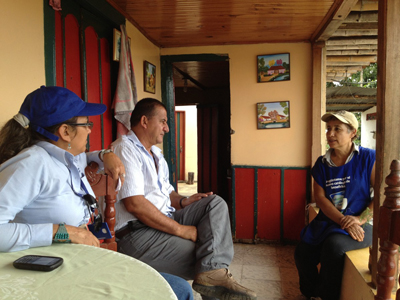It’s been five years since Gina died, but not a day passes that Don César doesn’t marvel at how much things have changed in Alcalá, his rural Colombian town, because of her.
In Alcalá, the name “Gina” symbolizes hope, inspiration, and connection. The iridescent plumage of the Highland Motmot Barranquero bird (a common bird-turned-official-town-mascot that inhabits the region’s ravines) is nicknamed “Gino” in her honor. The municipal water committee — formerly called “La Mesa por la Defensa del Agua” and formed by Gina as part of the Pride campaign she and her institution, the Regional Environmental Authority of Valle del Cauca (CVC), implemented in the area — was renamed Gina Julieta Marín Ospina. As Don César scans the lush landscape of his farm, La Esperanza (‘hope’ in Spanish), he can’t help but feel inspired by how a local public servant like Gina used something so simple and profound as a community aqueduct to motivate and connect him and his small town.

César García, or ‘Don César’, manages his family’s coffee and banana farm and serves as the General Manager of Alcalá ’s community aqueduct. The rural Cooperativa Acueducto Maravelez aqueduct, found in Colombia’s Los Ángeles Sub-Watershed in the northern part of the Valle del Cauca region, provides water for 1,063 people and serves an important social role for the community — it connects people living in the upper watershed with those who live downstream. Like his ancestors, he relies on healthy forests and clean water in the upper watershed to feed his farm. “My father and grandfather taught me that it was important to conserve water and recognize that landowners and producers, like us, can define whether others have water, clean or otherwise.”
It was as GM of the Maravelez aqueduct that he came to learn of Gina’s work with the CVC and its partnership with Rare to conserve Alcalá’s natural resources — specifically, helping landowners adopt more responsible farming practices and generating community pride in them. Through in-person visits and conversations with landowners, water users, and municipal authorities, Gina listened — and learned about the many challenges to conserve the watershed, such as landowners polluting the water, and a disconnect between those living in the upper part of the watershed and downstream water users on who is responsible for conservation. By listening, she also began to understand that upstream landowners and downstream water users wanted the same thing: a clean and reliable supply of water. She used this insight to design a social marketing campaign that helped both change their behaviors. With Don César at Gina’s side, it was obvious that listening to the community translated into building their trust — in Gina, in Don César, and in each other.
As a public servant of CVC, Gina believed in our potential, as community members and farmers, to lead in transforming how we manage our resources. Learning from Rare’s trainings in behavior change and social marketing, she taught me to make landowners feel important — because their actions impact others.” Don César, General Manager of Alcalá ’s Cooperativa Acueducto Maravelez aqueduct
Inspired by Gina’s early efforts six years before, the continued efforts of her colleague Harold Adrián Sánchez Marín since, and together with support from different institutions, such as CVC, Patrimonio Natural, Acuavalle, Acodal, Reverdece and Café Norte, Don César now leads the community’s campaign to generate agreements with landowners across Alcalá and the neighboring municipality of Finlandia to conserve the forest and improve productive practices for better water quality. “As a public servant of CVC, Gina believed in our potential, as community members and farmers, to lead in transforming how we manage our resources. Learning from Rare’s trainings in behavior change and social marketing, she taught me to make landowners feel important — because their actions impact others.”
Changes in Alcalá
According to Don César, Alcalá’s landowners are changing. The coffee producers who have signed agreements pollute less and generate their own fertilizers. Similarly, the cattle ranchers who have signed keep their cows from drinking from or defecating near upstream ravines. Water users are planting trees, and participating households are seeing economic savings from more efficient water use.
Further, community members are actively participating in decision-making for water management, with volunteer membership of the “Gina Ospina” water committee growing. Taken together, Don Cesar sees these changes as evidence of landowners and water users alike beginning to recognize the impact of their decisions — on their own farms, and on others — and understand the significant role that each actor plays within the community.
He tells the stories of Mr. José Roberto Quintero López, a coffee farmer, and Mr. José Leonel Restrepo, a cattle rancher, both of whom refused to entertain the idea of changing their farming practices. But little by little, hearing stories of success from neighboring farms — of newly-planted trees protecting land from erosion and riparian borders keeping the water clean for those downstream — both began to understand the multiple benefits of individually taking part in managing Alcalá ’s resources. “Mr. José Roberto now tells people his story, that he is a testament to the possibilities. While he was originally a barrier to change, he is now an example for the community.”
With new water agreements signed, over 70km of riparian fringe protected, 72 hectares which include forest in riparian areas and hectares liberated by cattle ranchers for conservation, over 1,000 trees planted, and over 30 community members (most female volunteers) participating in the “Gina Ospina” water committee, Don Cesar has every right to feel proud: Maravelez aqueduct has become a model aqueduct for other communities. He now fields requests by other aqueducts in Colombia to share the Maravelez experience and advise them on a path forward.
What’s Next

The upcoming Water Carnival, a well-known and growing community event that has become an annual tradition in Alcalá since the Pride campaign began, attracts neighboring municipalities, and will be an important opportunity to share the communities’ collective successes. The 7th annual Carnival, held every year on the heels of the UN’s ‘International Day of Water’ (March 22), will start the same as every other year: with a mass to remember Gina, and give thanks for the support of CVC and the many others who have worked tirelessly to make change happen. The Carnival will celebrate pride in local forests and water through a parade, cultural activities, and the crowning of the year’s “Water Queen’, who will serve as a spokesperson for conservation throughout the coming year.
It will also give Don César a forum to promote responsible farming behaviors and inspire participation from the community — particularly, more landowners to sign agreements and more water users to support conservation efforts. He will similarly use the opportunity to promote the benefits of registering as a formal water user (an ‘associate’), such as access to an education fund, and update the community on the many future activities planned to continue improving the aqueduct — advising other aqueducts, training students to work in the field, and presenting Maravelez’s successes at the national level.
Staring at an image of Guadalupe Virgen on his desk — a gift from Gina — Don César reflects on the road ahead. “Each of us has a role to play. We all depend on conservation, and together we must commit to playing our parts and inspiring others to do the same.”